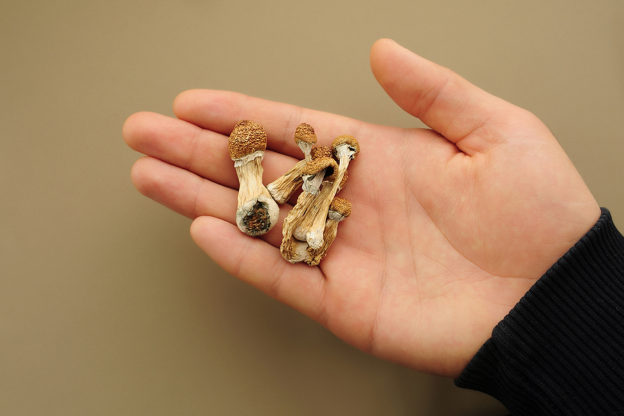By David Blyweiss, M.D., Advanced Natural Wellness
May 26, 2021
A lot of people think mushrooms are vegetables, but they are actually fungi. Should that make a difference to you? Maybe, maybe not.
But it’s interesting.
Back in the late 1920’s a bacteriologist named Alexander Fleming made a discovery. You know that name, right? He’s the guy who discovered penicillin. What’s interesting is how he discovered it.
It turns out he noticed fungus growing on a petri dish of Staphylococcus bacteria. For some reason, the bacteria wouldn’t grow anywhere near the fungus. And any bacteria near it was weak or dying.
The next thing you know, we have our first antibiotic!
The use of fungi in medicine didn’t stop with antibiotics. The active ingredients in several of today’s medications come from fungi. Transplant immunosuppressant drugs are one. Some others include meds used to treat multiple sclerosis, candida and migraines.
So there is a great deal of medicinal value in fungi. And this includes mushrooms.
Open your arteries, improve blood flow for a new health miracle...
Did you know your circulatory system has over 60,000 miles of arteries, veins and other blood vessels, if stretched end to end?
But as you age, your blood vessels undergo changes, which may cause them to stiffen, thicken and get clogged.
GOOD NEWS! Doctors have now identified a “Miracle Molecule” inside your arteries that helps OPEN your arteries and IMPROVE blood flow.
It’s what Dr. Valentin Fuster calls it, "One of the most important discoveries in the history of cardiovascular medicine."To you, that means...
- Healthy blood pressure
- Sharper mind and memory
- Skyrocketing energy and muscular strength
- Increased pleasure and passion in the bedroom
- Improved circulation to every cell and organ in your body
Go here to discover a new natural way to significantly boost the levels of this miracle molecule in YOUR body NOW!
Where do Mushrooms get their Super Power?
Mushrooms have been used as medicine for thousands of years. Some countries like Japan and China still use them. But it’s taking a long time for modern medicine in other countries to rediscover their health effect. The U.S. is one of those countries.
One of the things mushrooms have going for them is they’re the most abundant source of ergothioneine (ergo) in our food supply. This is a super-antioxidant.
Ergo has a special role when it comes to protecting your DNA and powering up your mitochondria. It’s a free radical scavenger, an anti-inflammatory and protects against inflammation.
Another powerful antioxidant in mushrooms is glutathione. It’s called the “master antioxidant” because it helps your body regenerate other antioxidants. It also neutralizes free radicals and, like ergo, it’s great at protecting your DNA and mitochondria.
Both ergo and glutathione have chelation activity that helps remove heavy metals like mercury and cadmium from your body.
Then there are all of the other vitamins and nutrients found in mushrooms, like potassium, copper, selenium, zinc and the B vitamins.
So mushrooms have a lot to offer. And eating them can provide all sorts of health benefits. These edible fungi…
- boost your immune system
- are anti-inflammatory
- protect against diabetes
- reduce the risk of heart disease
- lower your chances of non-alcoholic fatty liver
- reduce the risk of certain cancers
- improve cognitive function
And here’s something else.
Are Mushrooms a Weapon Against Viral Infections?
Are You Suffering From...
- Love handles and a pot belly
- Romance that isn't what it used to
- Forgetfulness and inattention
- Low (or no) strength and endurance
- A sex drive that's shifted into neutral...or worse
If so...you may have Mature Male Burnout. Click here to discover more about this unique condition and what you can do about it.
Mushrooms have the potential to be a powerful weapon against viruses like COVID.
In the initial stages of SARS-CoV-2 invasion, over-activation of the immune response is what causes symptoms. In some people symptoms are mild. In others they are very serious.
But we are seeing that powerful antioxidants like ergo might be able to shorten the duration and severity of viral infections, especially in the lungs. It works by reducing the severity of lung injury and inflammation by helping prevent a cytokine storm from happening.
Another thing? Both ergo and glutathione are protective of the mitochondria. This is a critical point, because viruses tend to hijack the mitochondria, putting them at the front line for long-term dysfunction.
Plus, mushrooms in general help to improve gut immunity and lower inflammation. These are both important when it comes to fighting off any type of disease or infection.
All in all, medicinal mushrooms could be a great add-on treatment to reduce the immune reaction and inflammation associated with viruses, and possibly even help prevent getting them in the first place.
I personally eat mushrooms all of the time. I eat them raw. I stuff them. I marinate and grill them. I put them in salads, wraps, soups and stews. I chop them up and toss them into dips and sauces.
It’s such an easy way to get more of the ergothioneine that mushrooms are uniquely high in.
For the highest ergothioneine content go for the exotics. Shiitake, oyster and maitake are the most potent. They can contain up to 13 mg of ergo in a three-ounce serving.
But that doesn’t mean you can’t get a decent dose of ergo in more commonly consumed mushrooms. Portabellas and creminis have a great ergothioneine profile, followed closely by white buttons.
If you’re anti-fungi – as some people are – you can always look for an ergothioneine supplement.
And by the way… don’t forget to buy organic!
SOURCES:
Paul BD, et al. The unusual amino acid L-ergothioneine is a physiologic cytoprotectant. Cell Death Differ. 2010;17(7):1134-1140.
Lam-Sidun D, et al. Mushroom-Derived Medicine? Preclinical Studies Suggest Potential Benefits of Ergothioneine for Cardiometabolic Health. Int J Mol Sci. 2021;22(6):3246.
Patel S, et al. Recent developments in mushrooms as anti-cancer therapeutics: a review. 3 Biotech. 2012;2(1):1-15.
Zhang M, et al. Dietary intakes of mushrooms and green tea combine to reduce the risk of breast cancer in Chinese women. Int J Cancer. 2009 Mar 15;124(6):1404-8.
Zhang S, et al. Mushroom consumption and incident risk of prostate cancer in Japan: A pooled analysis of the Miyagi Cohort Study and the Ohsaki Cohort Study. Int J Cancer. 2019 Sep 4.
Borodina I, et al. The biology of ergothioneine, an antioxidant nutraceutical. Nutrition Research Reviews. 2020;33(2), 190-217.
Cheah IK, et al. Could Ergothioneine Aid in the Treatment of Coronavirus Patients?. Antioxidants (Basel). 2020;9(7):595.
Hetland G, et al. Can medicinal mushrooms have prophylactic or therapeutic effect against COVID-19 and its pneumonic superinfection and complicating inflammation?. Scand J Immunol. 2021;93(1):e12937.
Dai X, et al. Consuming Lentinula edodes (Shiitake) Mushrooms Daily Improves Human Immunity: A Randomized Dietary Intervention in Healthy Young Adults. J Am Coll Nutr. 2015;34(6):478-87.







